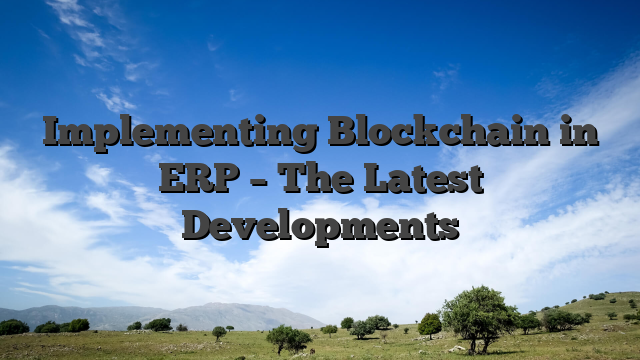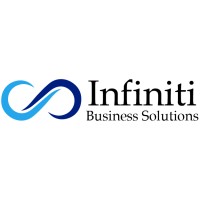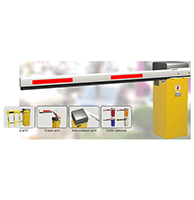The integration of blockchain technology with Enterprise Resource Planning (ERP) systems represents a noteworthy advancement in the management and security of vital business activities for enterprises. As we delve into this fascinating intersection, let’s first understand what these terms mean.
The potential when these two powerful tools come together. Integrating blockchain with ERP technology could revolutionize how businesses operate and manage data. Let’s explore how this integration is not just a technological upgrade but a gateway to unprecedented efficiency and security.
Understanding Blockchain Technology in the Context of ERP
The Basics of Blockchain
Blockchain is a technology for securely storing data that is hard to alter or hack. It is a distributed digital record of transactions that is replicated throughout the blockchain’s complete network of computer systems. It makes use of distributed ledgers, which are databases that are accessible from several places over a network.
Addressing ERP Challenges
Now, how does this relate to ERP systems? Although traditional ERP systems are great at handling large volumes of data, they frequently have issues with data security and transparency. Here’s where blockchain steps in. By integrating blockchain, ERP systems can ensure that every piece of data is secure and tamper-proof. For instance, in supply chain management, blockchain can provide a clear, unchangeable record of product journeys from manufacture to sale.
Real-World Examples
Consider a company that uses cloud ERP software to manage its supply chain. Every stage of the product’s journey is documented using blockchain in a way that cannot be changed. This means there’s a reliable and transparent trail from the manufacturer to the consumer, enhancing trust and efficiency.
Read More – Singapore Software Development Company
Recent Developments in Blockchain for ERP
Technological Advancements
The world of blockchain is ever-evolving. Recent advancements have introduced features that make it even more beneficial for ERP systems. These include enhanced data security measures and improved integration capabilities, making blockchain not just a secure option, but a seamlessly integrated part of ERP systems.
Beneficial Features for ERP
Some of the new features of blockchain technology particularly beneficial for ERP include smart contracts and improved traceability. Smart contracts automate transactions and ensure that all parties meet their obligations, thereby streamlining business processes. Improved traceability means businesses can now track the movement of goods with greater accuracy and efficiency.
Cutting-edge Integrations
Industries of all types are recognizing the benefits of blockchain-ERP integration. For example, in the healthcare industry, this integration ensures the secure and transparent handling of sensitive patient data. It makes it possible to trace products in real-time in the manufacturing industry, guaranteeing that every component used in the process is genuine and accounted for. These illustrations show how blockchain technology is changing ERP systems to improve their security, transparency, and effectiveness.
Industry Applications of Blockchain in ERP
The integration of blockchain technology with ERP (Enterprise Resource Planning) systems has shown promise in the rapidly evolving field of enterprise technology. This fusion is not just a buzzword but a practical solution adopted by leading ERP vendors like SAP, Microsoft, and Oracle. Their goal? to completely transform how companies manage transactions and data.
The Manufacturing Sector
In manufacturing, the integration of blockchain with ERP technology is transforming operations. Picture this: a single manufactured part consists of numerous components, each sourced from different suppliers. Blockchain steps in to create a real-time ledger, meticulously tracking each component’s journey. This method isn’t just about efficiency; it’s about pinpointing where and when issues arise. If a problem is detected, manufacturers can isolate and address it swiftly, minimizing disruptions.
Moreover, blockchain enriches communication between supply chain stakeholders. This is especially important for businesses that have a large supplier network. Blockchain streamlines processes like as audits, product certification, service-level agreement creation, financial management, and auditing. The result? A cohesive, transparent, and efficient supply chain.
The Food and Beverage Industry
Next, let’s explore the food and beverage industry. Here, blockchain’s role is crucial in ensuring quality and safety. Using real-time transaction data, blockchain swiftly identifies potential contamination sources in the supply chain. This rapid response is invaluable. It prevents the need for widespread shutdowns and recalls, safeguarding both consumer health and the company’s reputation.
Read More – Software Development Companies in Singapore
Comprehensive Benefits of Implementing Blockchain in ERP Systems
- Enhanced Security and Fraud Prevention: With blockchain, every transaction is recorded on a secure, immutable ledger. This means increased security and a significant reduction in fraud risks.
- Supply Chain Management Efficiency: The integration leads to more transparent and traceable supply chain operations. It is simpler to keep an eye on the flow of goods and make sure they adhere to quality requirements.
- Compliance Tracking: Industries like healthcare and manufacturing often face stringent regulatory requirements. Even in cases where there is much complexity, blockchain makes managing compliance documents easier.
- Simplified Multi-Party Transactions: Business dealings often involve several parties and processes. Blockchain smoothens these transactions, reducing friction and complexity.
- Equipment Maintenance Optimization: By coupling blockchain with the Internet of Things (IoT), companies can automate maintenance schedules and enhance asset utilization.
- Reduction in Paper-Based Processes: Integrating blockchain with ERP systems paves the way for more digital transactions, cutting down on paperwork and freeing up time for critical business activities.
Challenges and Considerations
An important step towards more safe, effective, and transparent corporate operations has been taken with the assistance of ERP software providers are integrating blockchain technology into ERP systems. While the integration of blockchain in ERP technology offers numerous benefits, it’s not without its challenges.
Technical Hurdles
The foremost challenge lies in the technical integration of blockchain with existing ERP systems. This process demands a certain level of technical expertise and infrastructure modification. Companies need to ensure their current systems can seamlessly merge with blockchain technology.
Organizational Adjustments
Another critical aspect is the organizational change that comes with blockchain integration. Employees need training and time to adapt to the new system. This change management is vital for a smooth transition.
Regulatory and Compliance Issues
Dealing with regulatory and compliance issues is another challenge. Since blockchain technology is very new, laws pertaining to it are continually developing. Companies need to stay informed and compliant with these changing rules.
Cost-Benefit Analysis
Implementing blockchain in ERP systems requires investment. Companies need to perform a comprehensive cost-benefit analysis to make sure that the investment is justified by the return.




